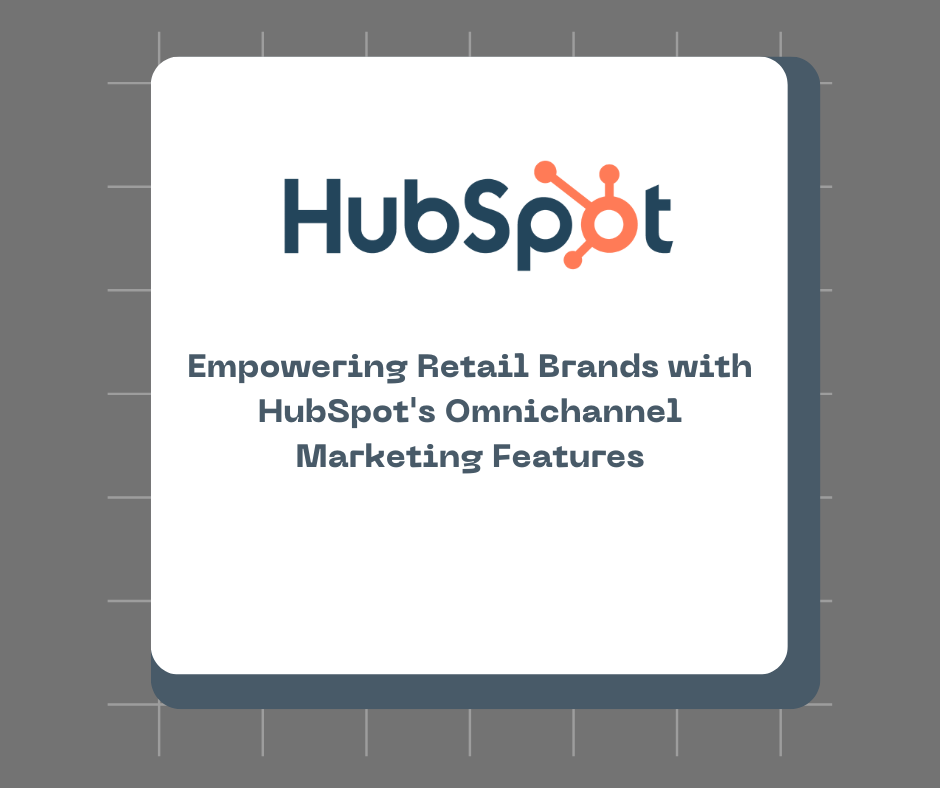In the ever-evolving landscape of retail, providing a seamless and integrated shopping experience across multiple channels is no longer a luxury but a necessity. With consumers expecting convenience, personalization, and consistency in their interactions with retail brands, businesses must adopt omnichannel marketing strategies to meet these demands and stay ahead of the competition. HubSpot, a leading marketing automation platform, offers a comprehensive suite of omnichannel marketing features that empower retail brands to deliver cohesive, personalized experiences that drive engagement, loyalty, and sales. In this article, we'll explore how retail brands can leverage HubSpot's omnichannel marketing capabilities to maximize success and delight customers at every touchpoint.
Understanding Omnichannel Marketing in Retail
Omnichannel marketing is a strategic approach that focuses on providing a seamless and integrated shopping experience across multiple channels, both online and offline. Unlike multichannel marketing, which involves using different channels independently, omnichannel marketing aims to create a unified and cohesive experience for customers, regardless of how they choose to engage with the brand. This approach allows retailers to meet customers where they are, anticipate their needs, and deliver personalized experiences that drive engagement and loyalty.
Leveraging HubSpot's Omnichannel Marketing Features
HubSpot offers a wide range of omnichannel marketing features that empower retail brands to create cohesive, personalized experiences across various channels and touchpoints. From email marketing and social media to website optimization and customer relationship management (CRM), HubSpot provides the tools and capabilities retailers need to engage customers effectively and drive sales.
1. Email Marketing Automation
Email marketing remains a powerful tool for engaging customers and driving sales in the retail industry. HubSpot's email marketing automation features enable retailers to create personalized, targeted email campaigns that resonate with their audience and drive action. By segmenting email lists based on customer demographics, purchase history, and engagement behavior, retailers can deliver relevant content and offers that speak directly to individual preferences and interests, driving higher open rates, click-through rates, and conversions.
2. Social Media Management
Social media plays a critical role in the retail customer journey, providing opportunities for brands to connect with customers, showcase products, and drive engagement. HubSpot's social media management features enable retailers to schedule posts, monitor engagement, and analyze performance across various social media platforms. By maintaining an active presence on platforms like Facebook, Instagram, Twitter, and LinkedIn, retailers can engage with customers in real-time, respond to inquiries and feedback, and build a loyal and engaged following.
3. Website Optimization
A well-designed and user-friendly website is essential for providing a seamless shopping experience and driving conversions in retail. HubSpot's website optimization tools enable retailers to create responsive, visually appealing websites that are optimized for search engines and user experience. By leveraging features such as drag-and-drop page builders, customizable templates, and A/B testing, retailers can create engaging and conversion-focused landing pages, product pages, and checkout experiences that drive sales and delight customers.
4. Customer Relationship Management (CRM)
Effective customer relationship management is key to delivering personalized experiences and building long-term loyalty in retail. HubSpot's CRM platform allows retailers to centralize customer data, track interactions, and segment audiences based on various criteria. By integrating customer data from multiple sources, including email, social media, and website interactions, retailers can gain a comprehensive view of their customers and deliver personalized communication and offers that drive engagement and repeat purchases.
5. Automation Workflows
Automation workflows are essential for streamlining processes, delivering personalized communication, and nurturing leads throughout the customer journey. HubSpot's automation features enable retailers to create automated workflows that trigger actions based on specific customer behaviors and events. Whether it's sending personalized follow-up emails, updating customer records, or notifying sales teams of new leads, automation workflows help retailers deliver timely and relevant communication that drives engagement and conversion.
6. Analytics and Reporting
Measuring the effectiveness of omnichannel marketing efforts is essential for optimizing strategies and driving continuous improvement. HubSpot's analytics and reporting features provide retailers with valuable insights into campaign performance, customer engagement, and sales attribution across various channels and touchpoints. By analyzing data such as website traffic, email open rates, and conversion metrics, retailers can identify trends, measure ROI, and make data-driven decisions to improve their omnichannel marketing efforts and drive business growth.
Conclusion
In today's competitive retail landscape, delivering seamless, personalized experiences across multiple channels is essential for driving engagement, loyalty, and sales. HubSpot's omnichannel marketing features provide retailers with the tools and capabilities they need to create cohesive, personalized experiences that delight customers at every touchpoint. By leveraging email marketing automation, social media management, website optimization, CRM, automation workflows, and analytics and reporting, retailers can engage customers effectively, drive conversions, and build long-term loyalty. With HubSpot as their partner, retailers can unlock the full potential of omnichannel marketing and position themselves for success in the digital age.
Schedule your training session here and comment “Need Training” on the request form.

Comments